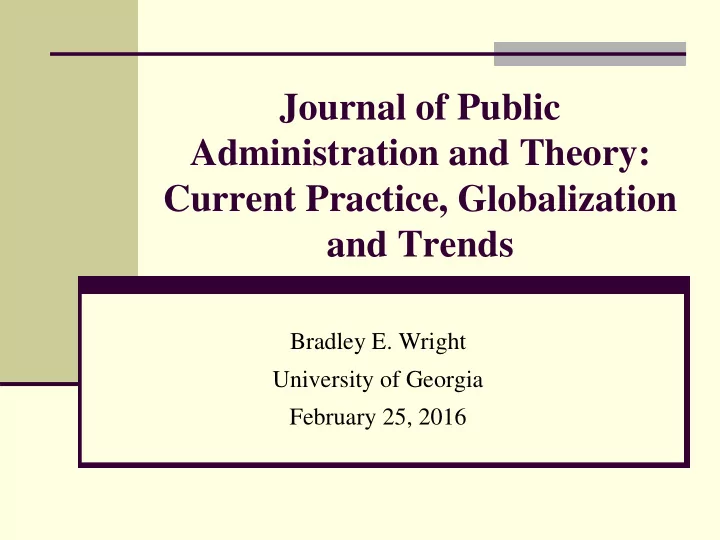

Journal of Public Administration and Theory: Current Practice, Globalization and Trends Bradley E. Wright University of Georgia February 25, 2016
Journal of Public Administration Research and Theory Receive over 420 manuscripts a year Publish 36-40 articles a year 8% acceptance rate 46% of submissions desk rejected 38% are rejected in the first round of reviews (70% of those sent for review are rejected) 8% are rejected in second round of reviews (45% of those sent for 2 nd review are rejected)
JPART: Impact Online Downloads Full Text Abstracts 2008 83,409 200,537 2014 153,219 279,718 Impact Factor 2 year 5 year 2008 1.509 2.493 2014 2.883 3.552 Ranked #1 since 2013 2009
JPART: Circulation
JPART: 2015 Submissions By Country of Origin
JPART: Accepted manuscripts since 2014 By Country of Origin
Common Themes for Rejections 1. Fit 2. Framing & Theoretical Contribution 3. Readability 4. Methodological Rigor / Method
JPART: Mission Serves as a bridge between public administration and public management scholarship on the one hand and public policy studies on the other. Its multidisciplinary aim is to advance the organizational, administrative, and policy sciences as they apply to government and governance. The journal is committed to diverse and rigorous scholarship and serves as an outlet for the best conceptual and theory-based empirical work in the field
JPART: Mission Serves as a bridge between public administration and public management scholarship on the one hand and public policy studies on the other. We publish manuscripts on policy implementation but not policy analysis/evaluation or policy process
JPART: Mission Its multidisciplinary aim is to advance the organizational, administrative, and policy sciences as they apply to government and governance. We do not publish studies on the private or nonprofit sector unless they have a very strong tie to government administration
JPART: Mission The journal is committed to diverse and rigorous scholarship and serves as an outlet for the best conceptual and theory-based empirical work in the field The primary criterion used for publication is whether it makes is a significant theoretical contribution Good data and strong methods alone is not enough Focus is on testing and advancing academic theory not on practice
Common Themes for Rejections Fit Review journal mission Look at what they publish Look at what you cite
Common Themes for Rejections Framing & Theoretical Contribution Underdeveloped Theory Theory by citation with causal reasoning and explanation lacking “Reviewers look to the theory section to find a clear theoretically driven narrative not a literature review” Some helpful resources What Theory is Not (Sutton & Staw, 1995) What Constitutes Theory (Whetten, 1989) Grounding Hypotheses (AMJ, 2011, 54(6), 1098-1102 )
Common Themes for Rejections Framing & Theoretical Contribution Make it clear how your paper helps close the gap between what we know and what we need to know. Sell the reader on why we needed to know it Just because no one has done it before is not a reason to do it now Small contributions and validation studies are important but may limit where you can publish Primary criterion for publishing in JPART is the ability to make a significant theoretical contribution
Common Themes for Rejections Framing & Theoretical Contribution Old Idea in New Country - Applying well established theories and ideas to a new setting is not enough Must show how the variability in the setting adds new insights or boundary conditions to current theory Comparing Countries - Identifying descriptive differences between 2 countries Need to develop new/interesting ideas on why the differences might exist that challenge old assumptions
Common Themes for Rejections Framing & Theoretical Contribution Consensus Shifting – Challenge widely held theoretical assumptions and describe the implications of that challenge Consensus Creation – Identify inconsistencies in the literature and try to resolve the conflict Synthesized Coherence – identify and link theories/ideas/literatures together in new ways
Current Concerns: Replication & the Crisis of Confidence
Current Concerns: Replication & the Crisis of Confidence Data reuse policy Reproducibility &
Current Concerns: Replication & the Crisis of Confidence Data reuse policy Reproducibility &
Review Process
Recommend
More recommend